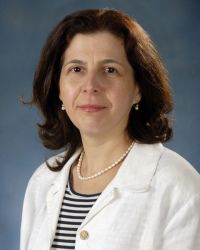Agnès Azimzadeh passed away on March 15, 2021, after a courageous battle with intestinal cancer. She leaves her devoted husband, Djavad; their sons Julien and Philippe, and Julien’s wife Rebecca; her parents, Simone and Bernard Isabey; her brother Daniel Isabey; and her family-by-affection Li Ni and Julie Lin. The scientific and clinical transplant communities she touched at Massachusets General Hospital, University of Maryland, and around the world join her family in celebrating her life, and mourning her premature loss.
Agnès grew up in the Franche-Comté region of France. She received her Ph.D. in Molecular and Cellular Biology and Immunology from the University Louis Pasteur in Strasbourg, France (1992) under the mentorship of Dr. Marc Van Regenmortel. During her post-doctoral fellowship (1993-99) while working on xenotransplantation at Strasbourg’s Institute of Transplantation with professors Cazenave and Soulilou, she began to develop her extensive network of national and international collaborators. In 1999 she formed a 22-year scientific partnership with Richard N. Pierson III, working at Vanderbilt University (1999-2002), University of Maryland (2002-2018), and Massachusetts General Hospital (2018-2021).
Most of her scientific contributions related to translational studies conducted in primate models. Her important role in these multi-investigator collaborative studies were recognized by a “Grand Prix de Medicine” award from the Academy of Sciences of Toulouse (1997), and a Young Investigator’s Award (2002) and recognition as a Key Opinion Leader (2006) by The Transplantation Society. She was particularly recognized for her collaborative contributions to develop and apply molecular biologic techniques to monitor innate immunity, adaptive immunity, and inflammation in primate transplant models. Her work in collaboration with Dr. Pierson was funded continuously since 1999 by NIH and many other sources.
Agnès had a long-standing interest in xenotransplantation, and her diagnostic tools and the mechanistic insights they enabled have nourished steady progress in this field in the last two decades. She was part of the team that clarified the role of natural antibodies, complement, and coagulation in liver and lung xenograft rejection in the 1990’s, in particular for the first time elucidating the contribution of porcine von Willebrand’s factor (vWF) to coagulation pathway dysregulation in baboons. Her technical expertise enabled design of immunologic and molecular tools that were informative during evaluation of very expensive and rare genetically modified pigs as they were developed, and contributed to the remarkable recent progress of this field toward clinical application. Her contributions in the field of xenotransplantation were recently recognized by her election to the Presidency of the International Xenotransplantation Association (2019-21). She also studied the role of both anti-donor antibodies (alloantibodies) and auto-antibodies in the pathogenesis of chronic heart allograft rejection during blockade of the CD40, CD154, and CD28 costimulation pathways. Her work unveiled the contribution of alternative costimulatory pathways to graft injury: ICOS and CD28-driven chronic rejection occurred despite CD154 blockade that was efficient to produce ‘tolerance’ to viral antigens in the same experimental subjects. Her work with Dr. Pierson on pre-emptive B cell depletion in primates led to an NIH-funded clinical trial (CTOT-11).
Agnès wrote of herself, “I love teaching and take it very seriously”. She mentored over 40 medical students, and over 20 post-doctoral fellows, as well as countless young faculty members, many of whom are are now established as independent investigators. She was an invaluable counselor to the IXA, and selfless scientific and professional advisor to an array of international collaborators working in the field of xenotransplantation. She will perhaps be best remembered for her warmth of spirit, and her love of quality, which she found and appreciated deeply in friends, food, and science.
In lieu of flowers, the family requests that gifts be directed either to the MGH Cancer Center, in support of research ], or to the IXA, in support of an awards program to be established in her memory. Agnès Azimzadeh Fund



